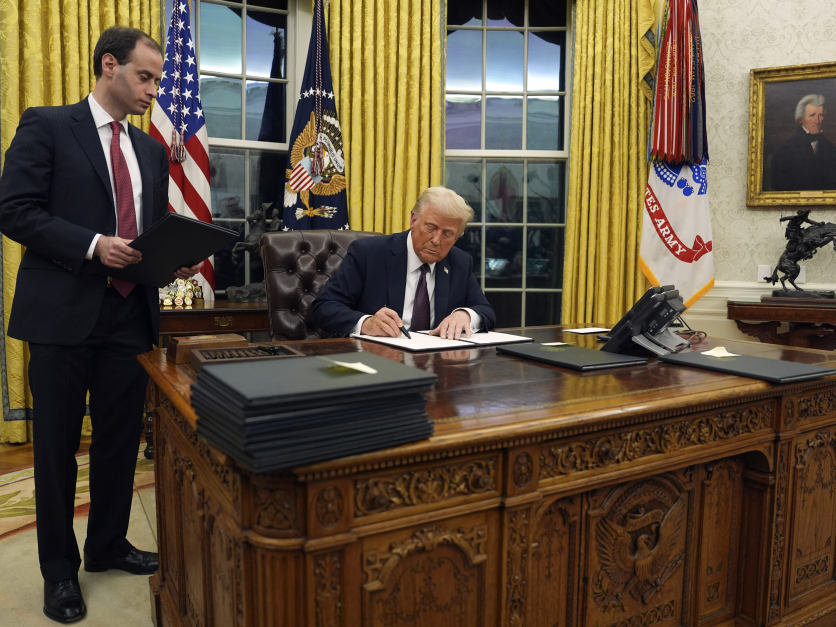President Donald Trump has wasted little time making news on the trade front. He told reporters Monday night he expects to impose 25% tariffs on Canada and Mexico a week from Saturday.
"We're thinking in terms of 25% on Mexico and Canada ... I think we'll do it Feb. 1,” Trump said.
Trump used his inaugural address Monday to double-down on his pledge to increase tariffs, but didn’t go into specifics. Trump had suggested in November that he could hike tariffs on Mexico and Canada on the first day of his presidency. He has also pledged new tariffs on Chinese goods. Canada has reportedly prepared retaliatory measures to respond to Trump’s threat.
Take note: In a memo sent to senior administration officials Tuesday, the president outlined his vision for U.S. trade policy. The memo directs federal agencies to address trade deficits, study currency and trade actions unfavorable to the U.S. and explore the feasibility of an “external revenue service” to collect tariff revenue. The Office of the U.S. Trade Representative was instructed to identify countries for bilateral or sectoral trade deals.
Read our report on Trump’s second inaugural address.
USDA’s CIO takes over as acting secretary
Gary Washington, who has been USDA’s chief information officer since 2018, is now serving as acting agriculture secretary while Brooke Rollins’ nomination moves through the Senate. Her hearing is scheduled for Thursday in the Senate Ag Committee.
Washington was formerly the CIO for the Animal and Plant Health Inspection Service and the Natural Resources Conservation Service.
Elsewhere: Jim Payne, EPA’s deputy general counsel for environmental media and regional law offices, is serving as the agency’s acting administrator. The acting interior secretary is Walter Cruickshank, who is deputy director of the Bureau of Ocean Energy Management.
Also on the first day: Trump is pulling the U.S. out of the Paris climate agreement, as he did in his first term – although the official withdrawal didn’t come until after the 2020 presidential election, which was won by Joe Biden.
A series of executive orders Trump issued Monday include one freezing government hiring outside of national security jobs. Another order directs EPA to consider emergency waivers to allow year-round sales of E15.
More appointments: Rural broadband proponent Brendan Carr has been named chair of the Federal Communications Commission. Carr has also been a fierce defender of Starlink, a satellite internet subsidiary of Elon Musk’s SpaceX, and decried a previous FCC decision to revoke broadband funding for the company over concerns about its ability to meet service requirements.
It’s easy to be “in the know” about what’s happening in Washington, D.C. Sign up for a FREE month of Agri-Pulse news! Simply click here
Andrew Ferguson is now the chair of the Federal Trade Commission. Last week, Ferguson criticized a decision made by the committee majority to authorize a lawsuit accusing equipment manufacturing giant John Deere of violating antitrust laws with its repair practices.
He said he supports the idea of right-to-repair legislation, but expressed concern about the lawsuit’s timing, which he said gives it a “stench of partisan motivation.”
Patrick Fuchs, a former Senate Transportation Committee staff member, is the new chair of the Surface Transportation Board, which is tasked with overseeing railroad competition issues.
Jeffery Hall will succeed Vincent Logan as chair of the Farm Credit Administration. Hall’s an Obama appointee and despite his term expiring in Oct. 2018, continues to serve on the board in the absence of a replacement.
Ramaswamy to leave DOGE, which is hit with lawsuits
The Trump administration is losing half of the two-person team heading up the Department of Government Efficiency, leaving billionaire Trump ally and donor Elon Musk to lead the effort to trim trillions in government costs.
Vivek Ramaswamy is leaving DOGE to run for governor of Ohio, multiple news outlets reported Monday.
Also on the DOGE front: Three lawsuits were filed Monday over DOGE. Two claim its operation violates the Federal Advisory Committee Act.
“Despite the name, DOGE is not a department of the United States government,” Public Citizen, the American Federation of Government Employees and the State Democracy Defenders Fund said in a news release.
Their lawsuit names Trump and the Office of Management and Budget as defendants, charging that they are violating FACA, in part because DOGE’s members don’t have a fair balance of viewpoints, meetings are not public, and records and work product are not available to the public. Another, similar suit was filed by National Security Counselors, a law firm.
The Center for Biological Diversity, a frequent opponent of the federal government in court, also sued to obtain records on DOGE’s operations.
Michigan Potash gets conditional loan guarantee
A new facility in Michigan would triple domestic potash production. Michigan Potash & Salt Company has gotten a conditional commitment for a loan guarantee of up to $1.26 billion from the Department of Energy for a new potash and salt production facility in Osceola County.
Once operational, it will extract and process about 800,000 tons of potash and 1 million tons of food-grade salt each year. In 2023, the U.S. produced about 400,000 metric tons of potash and imported 5 million.
Final word
“Our country was forged and built by the generations of patriots who gave everything they had for our rights and for our freedom. They were farmers, cowboys and factory workers, steel workers and coal miners, police officers and pioneers who pushed onward, marched forward and let no obstacle defeat their spirit or their pride.” – President Trump in his second inaugural address
For more news, go to www.Agri-Pulse.com..






![Steve headshot 250x200[1]](http://www.agri-pulse.com/ext/resources/Headshots/Staff-Photos/thumb/Steve_Headshot_250x200[1].JPG?1738947158)
